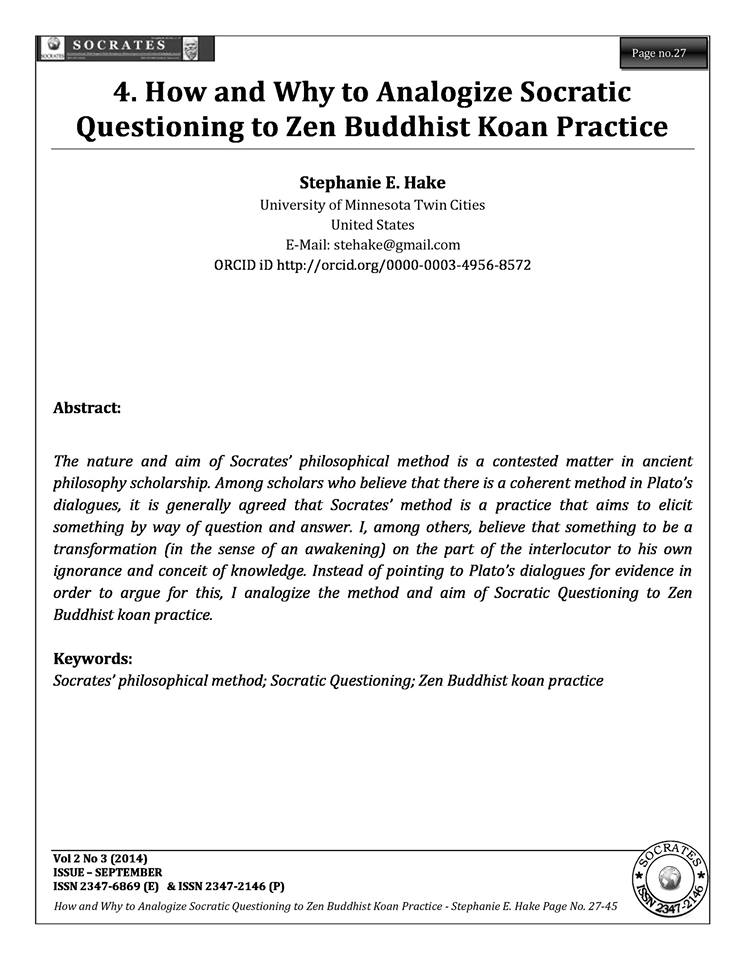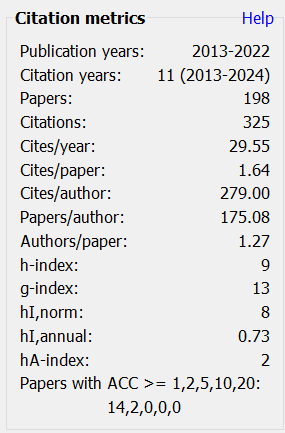How and Why to Analogize Socratic Questioning to Zen Buddhist Koan Practice
Keywords:
Socrates’ philosophical method, Socratic Questioning, Zen Buddhist koan practiceAbstract
The nature and aim of Socrates’ philosophical method is a contested matter in ancient philosophy scholarship. Among scholars who believe that there is a coherent method in Plato’s dialogues, it is generally agreed that Socrates’ method is a practice that aims to elicit something by way of question and answer. I, among others, believe that something to be a transformation (in the sense of an awakening) on the part of the interlocutor to his own ignorance and conceit of knowledge. Instead of pointing to Plato’s dialogues for evidence in order to argue for this, I analogize the method and aim of Socratic Questioning to Zen Buddhist koan practice.
Downloads
Metrics
References
Beversluis, J. (2000). Cross-Examining Socrates. New York: Cambridge University Press.
Brickhouse, T.C. and N.D. Smith. (2000). The Philosophy of Socrates. Colorado: Westview Press.
Forster, M. (2006). “Socrates’ Demand For Definitions”. In D. Sedley (Ed.). Oxford Studies in Ancient Philosophy XXXI, 31,
Foulk, T.G. (2000). “The Form and Function of Koan Literature: A Historical Overview”. The Koan: Texts and Contexts in Zen Buddhism. New York: Oxford University Press.
Frede, M. (1992). “Plato’s Arguments and the Dialogue Form”. Oxford Studies in Ancient Philosophy. Oxford: Oxford University Press.
Grube, G.M.A. (1981). Five Dialogues: Euthyphro, Apology, Crito, Meno, Phaedo. Indiana: Hackett Publishing Company.
Heine, S. and D.S. Wright. (2000). “Introduction: Koan Tradition—Self-Narrative and Contemporary Perspectives”. The Koan: Texts and Contexts in Zen Buddhism. New York: Oxford University Press.
Kraut, R. (2013). "Plato". The Stanford Encyclopedia of Philosophy. E.N. Zalta (Ed.). Retrieved from http://plato.stanford.edu/archives/fall2013/entries/plato/.
Nails, D. (1999). “Mouthpiece Schmouthpiece”. Who Speaks for Plato? G.A. Press. (Ed.). Lanham: Rowman and Littlefield.
Peterson, S. (2011). Socrates and Philosophy in the Dialogues of Plato. New York: Cambridge University Press.
Plato. (1987). Gorgias. D.J. Zeyl (Trans.). Indianapolis: Hackett Publishing Company.
---. Five Dialogues: Euthyphro, Apology, Crito, Meno, Phaedo. G.M.A. Grube (Trans.). Indianapolis: Hackett Publishing Company, 2002. pg, 1-20, 21-44, 58-92.
Sick, D. (2007). “When Socrates met the Buddha: Greek and Indian Dialectic in Hellenistic Bactria and India”. Journal of the Royal Asiatic Society of Great Britain and Ireland 17.3.
SparkNotes Editors. “SparkNote on Meno.” SparkNotes.com. SparkNotes LLC. n.d.. Web. 22 Jun. 2014.
Tarrant, H. (2002). “Elenchos and Exetasis: Capturing the Purpose of the Socratic Interrogation”. Does Socrates Have a Method? Rethinking the Elenchus in Plato’s Dialogues and Beyond. Ed. Scott, G.A. University Park, PA: The Pennsylvania State University Press.
Suzuki, S. (1970). Zen Mind, Beginner’s Mind. Ed. Trudy Dixon. New York: John Weatherhill, Inc.
Vlastos, G. (1983). “The Socratic Elenchus”. The Oxford Studies in Ancient Philosophy.
Wolfsdorf, D. (2013). “Socratic Philosophizing”. The Bloomsbury Companion to Socrates. Bloomsbury Academic.
Zehl, D. (1987). “Introduction”. Gorgias. Indianapolis: Hackett Publishing Company.
Zen Buddhism: An Introduction to Zen with Stories; Parables and Koan Riddles Told by the Zen Masters. Mount Vernon, New York: Peter Pauper Press, 1959.

Downloads
Published
How to Cite
Issue
Section
License
Revised Copyright/CC license that applies to all the articles published after 05-02-2017
Attribution-NonCommercial 4.0 International (CC BY-NC 4.0)

Copyright/CC license that applies to all the articles published before 05-02-2017
Attribution-Non Commercial-No Derivatives 4.0 International (CC BY-NC-ND 4.0)

Author(s) will retain all the right except commercial and re-publishing rights. In the case of re-publishing, they will have to obtain written permission from the journal. Additional licensing agreements (Creative Commons licenses) grants rights to readers to copy, distribute, display and perform the work as long as you give the original author(s) credit, they can not use the works for commercial purposes and are not allowed to alter, transform, or build upon the work. For any reuse or distribution, readers and users must make clear to others the license terms of this work. Any of these conditions can be waived if you get permission from the copyright holders. Nothing in this license impairs or restricts the authors’ rights. To view a copy of this license, visit http://creativecommons.org/licenses/by-nc-nd/4.0/ or send a letter to Creative Commons, 171 Second Street, Suite 300, San Francisco, California, 94105, USA.
Research Papers published in SOCRATES are licensed under an Attribution-NonCommercial-NoDerivatives 4.0 International (CC BY-NC-ND 4.0)












